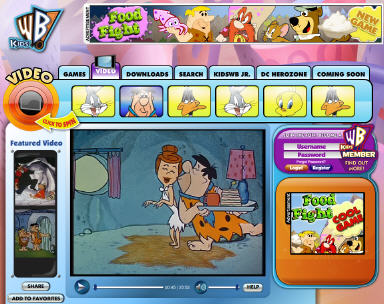-
New Warner Bros' Sites Showcase Broadband's Abundance
The news yesterday that Warner Bros Television Group plans to launch TheWB.com as an online outlet to offer its catalog of popular programs and KidsWB.com to house its animated favorites are further reminders that broadband's infinite shelf space creates all kinds of new opportunities for broadcasters and studios ready to experiment and be creative.
I regard these moves as the latest evidence that industry players are beginning to understand how programming in a broadband world differs from business-as-usual approaches. If there is one word that captures the essence of the traditional world it would be "scarcity." Scarcity of time slots, distributors, eyeballs, financing, brands, advertising dollars, ideas, etc. The whole broadcasting and studio paradigm is built on a zero sum - and legitimate - idea that only a very small handful of all creative pursuits can succeed at any one time.
Broadband explodes the scarcity model, introducing a world of abundance in which every scarcity constraint is alleviated or erased. Abundance thinking has guided online retailers for years: offering incremental inventory is dirt-cheap, and if made easily discoverable, it will find its buyers. In fact, as the incongruous popularity of "Arrested Development" on Hulu already shows, latent demand for catalog programming can actually be quite strong.
Evidence is growing that other video providers also understand the abundance concept. Recently other networks and studios have also launched their own efforts to monetize catalog programming. At my recent NAB panel, the head of CTV's 2012 Olympics coverage noted that ALL Olympic activity will be available for online viewing (their mantra is "Every Second Counts"). Also at NAB, I was introduced to a stealthy new initiative to make available high-quality archived video that has never been available online. I expect plenty more examples to come.
To be sure, broadband's abundance creates all kinds of new challenges: More audience fragmentation. New promotion and user navigation issues. More monetization complexity. New operational and management tasks. And so on.
Yet broadband's abundance should be viewed as a direct challenge to the historical scarcity model on which broadcasters' and studios' strategies have long been built. Industry participants who recognize the new world order and embrace it will be best-positioned to succeed.
What do you think of how broadband's abundance changes things? Post a comment and let everyone know!
Categories: Broadcasters, Studios
Topics: KidsWB.com, TheWB.com, Warner Bros
-
TV and Broadband: Who's Morphing into Whom?
Does TV programming beget broadband video programming or is it the other way around?
If you were expecting a simple answer, recent evidence suggests that none will be forthcoming. Step away from the relatively straightforward model of streamed or downloaded TV episodes, and the question of how original video content will be produced and distributed between broadband and TV is whole lot more complicated. Layer on the writers' strike and the world only fogs up further.
For those who see broadband as a pathway to TV, Quarterlife's deal announced last Friday with NBC to bring their new Quarterlife series to the network following its run on MySpace offers encouragement that Internet programming can move to the TV (bear in mind that Quarterlife was originally pitched as a TV series however).
Another example is TMZ.com, which has been successfully syndicated as TMZ TV this fall by Warner Bros. TMZ shows us that a brand that was created and built solely online can make the leap to TV. And just last week TV Week reported that Twentieth Television and Yahoo were close to a deal to create a new syndicated series based on popular broadband videos that they've collected.
On the flip side, there is plenty of evidence of opportunities for TV programs spinning off broadband programming, or existing TV producers with assets and skills pushing into broadband as a first outlet for their work.
Consider Sony's Minisode Network, with distribution on MySpace, Joost, AOL and Crackle. In an effort to squeeze more life out of its library of classics, in June Sony launched abbreviated versions, for broadband "snacking". This initiative is being closely watched as a model for how to repurpose existing assets to make them more palatable for attention-challenged online audiences.
And Endemol's recent deal with Bebo to produce "The Gap Year" series for exclusively for Bebo's audience shows that a successful TV producer is turning its sites on broadband as a first outlet.
All of these deals underscore broadband's disruptive nature - its ability to create new opportunities for incumbent players, and also for new entrants. My read is that most (though not all) broadband producers would love to make the leap to the TV. In the mean time, broadband offers a low-cost, interactive distribution path to experiment with more engaged audiences.
Many key industry players are now waking up to the idea that broadband is fundamentally re-writing traditional equations of how to extract value from well-produced video. But these equations are not yet well-understood. Some of the early deals, as outlined above, will be showing everyone the way.
Categories: Broadcasters, Indie Video, Partnerships, Video Sharing
Topics: AOL, Bebo, Crackle, Endemol, Joost, MySpace, NBC, Quarterlife, Sony, TMZ, Twentieth Television, Warner Bros, Yahoo
Posts for 'Warner Bros'
|



